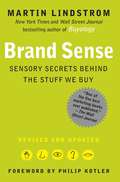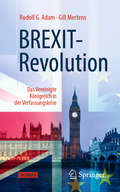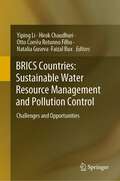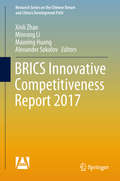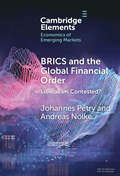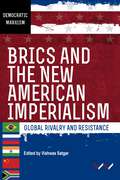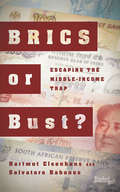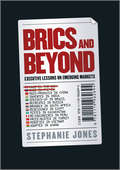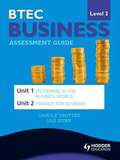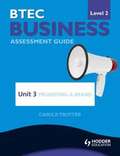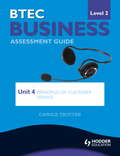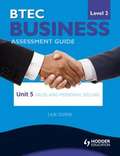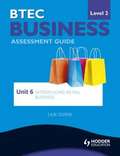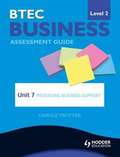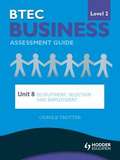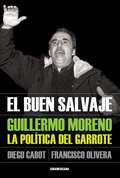- Table View
- List View
BRAC in 2020
by Tarun Khanna Shreya RamachandranIn 2020, the largest non-governmental organization in the world, BRAC, headquartered in Dhaka, Bangladesh, has some big problems to tackle. Its founder, Sir Fazle Hasan Abed, has left behind a challenge: take the 1981-founded organization from Bangladesh to every single part of the world and create a global set of programs and program heads. Active in education, health, microfinance and poverty alleviation, BRAC is also entering the humanitarian and relief world through its work with Rohingya refugee camps in Bangladesh. What will be the way forward for this global NGO based in the South?
BRAND sense: Sensory Secrets Behind the Stuff We Buy
by Martin LindstromIn perhaps the most creative and authoritative book on sensory branding ever written, international business legend Martin Lindstrom reveals what the world's most successful branding companies do differently -- integrating touch, taste, smell, sight, and sound -- with startling and measurable results. Based on the largest study ever conducted on how our five senses affect the creation of brands, BRAND sense explains Martin Lindstrom's innovative six-step program for bringing brand building into the twenty-first century. The study, covering over a dozen countries worldwide, was conducted exclusively for this book by Millward Brown, one of the largest business research institutions in the world. Drawing on countless examples of both product creation and retail experience, Lindstrom shows how to establish a marketing approach that appeals to all the senses, not simply the conventional reliance on sight and sound. Research shows that a full 75 percent of our emotions are in fact generated by what we smell, and the author explains how to capitalize on that insight. Included are innovative tools for evaluating a brand's place on the sensory scale, analyzing its future sensory potential, and enhancing its appeal to reach the broadest base of consumers. Lindstrom lists the top twenty brands for the future based on their sensory awareness. (The top three? Singapore Airlines, Apple, and Disney.) Among the book's many fascinating factual highlights are the following: That gratifying new-car smell that accompanies the purchase of a new car is actually a factory-installed aerosol can containing "new-car" aroma. Kellogg's trademarked crunchy sound and feel of eating cornflakes was created in sound labs and patented in the same way that the company owns its recipe and logo. Singapore Airlines has patented a scent that is part of every female flight attendant's perfume, as well as blended into the hot towels served before takeoff, and which generally permeates their entire fleet of airplanes. Starbucks' sensory uniqueness is far less strongly associated with the smell and taste of coffee than with the interior design of its cafés and its green and white logo. Hailed as the "World's Brand Futurist" by the BBC, Martin Lindstrom is one of the world's top entrepreneurial visionaries, who has changed the face of global marketing with twenty years of hands-on experience as an advertising CEO and adviser to Fortune 500 companies. Firmly steeped in scientific evidence and featuring sensory secrets of the most successful brand names, BRAND sense reveals how to transform marketing strategies into positive business results that no brand builder can afford to ignore.
BREXIT-Revolution: Das Vereinigte Königreich in der Verfassungskrise
by Rudolf G. Adam Gill MertensDer Brexit hat Großbritannien an den Rand einer Revolution geführt. Das Machtgefüge zwischen Krone, Regierung, Parlament und Volk ist aus dem Gleichgewicht geraten. Ein unabhängiges Schottland und ein vereinigtes Irland sind realistische Optionen. Die Gesellschaft Englands ist tief gespalten und das traditionelle Zwei-Parteien-System im Wanken. Nicht nur die äußere Abkehr des Vereinigten Königreichs von den Werten und Zielen der EU, sondern vor allem die Hinwendung nach innen, auf nationale Identität, macht den Brexit zu einem schleichenden Prozess, der noch nachwirken wird, wenn der Austritt Großbritanniens aus der EU längst vollzogen ist. Das Buch stellt den Folgeband zu „BREXIT – Eine Bilanz“ dar. Unter Berücksichtigung aktuellster Entwicklungen werden mögliche Folgen des EU-Austrittes rekapituliert und neu bewertet. Ausführliche Exkurse zu Themen wie Irland, dem Backstop, Boris Johnson oder der britischen Verfassung liefern dabei essenzielle Hintergrundinformationen aus Bereichen, die den Brexit maßgeblich mitbestimmen. Zusammen mit dem ersten Band bietet dieses Buch die gegenwärtig umfassendste Analyse des Brexit-Prozesses.
BRF
by Natalie Kindred David E. BellIn 2015, BRF's new leadership team is transforming several aspects of the Brazilian protein giant, which had grown sluggish after the 2011 merger that created it. Underlying their reforms are the common goals of reducing bureaucracy, streamlining decision making, and, most importantly, creating a unified culture that, to date, the company has been missing. CEO Pedro Faria believes a strong culture, in which both BRF employees and its thousands of supply partners feel a sense of pride and ownership in working with BRF, will be critical to enabling BRF's global ambitions.
BRICS Countries: Challenges and Opportunities
by Faizal Bux Yiping Li Hirok Chaudhuri Otto Corrêa Rotunno Filho Natalia GusevaThis book provides a detailed study and assessment of water resources management andpollution control in different BRICS countries. The regions involved areBrazil, Russia, India, China and South Africa. This book gives importantinsight into how future sustainability depends on the development of effectivewater governance mechanisms at the level of countries. According to theregional characteristics from different aspects it cuts into the waterenvironment problems and studies in different ways, which is multifaceted andtargeted. Using case studies that include environmentally integrated basinexperiments (eibex) of Brazil, groundwater overflow zone of India, semi-aridriver basin of South Africa and so on, this volume provides criticalinformation for researchers and policymakers.
BRICS Innovative Competitiveness Report 2017 (Research Series on the Chinese Dream and China’s Development Path)
by Alexander Sokolov Xinli Zhao Minrong Li Maoxing HuangThe Report predicts that the coming five years will witness the five countries keep improving in national innovative competitiveness, with China and Russia maintaining their strong growth momentum, India growing at a moderate rate, and Brazil and South Africa gradually picking up speed and climbing out of the trough. It estimates that the five countries’ national innovative competitiveness will be keeping steady growth by 2030. The General Reports part presents a comprehensive analysis of the current status and achievements of STI cooperation between China and other BRICS countries and proposes priority areas of BRICS STI cooperation to provide valuable decision inputs for the BRICS countries to accelerate the improvement of their national innovative competitiveness. The Country Reports part respectively analyzes and makes predictions on the national innovative competitiveness of the BRICS countries based on a survey of their STI development and STI cooperation within the BRICS framework. The Thematic Reports part focuses on four thematic areas closely related to STI, i.e. digital economy, financial inclusion, energy, and agriculture, and offers detailed analysis of the STI development and potential of the countries in relevant areas, providing additional inputs for a further understanding of the national innovative competitiveness of the BRICS countries.
BRICS and the Global Financial Order: Liberalism Contested? (Elements in the Economics of Emerging Markets)
by Andreas Nölke Johannes PetryThe global financial system is the economic bedrock of the contemporary liberal economic order. Contrary to other global-economy areas, finance is rarely analyzed in discussions on contestations of economic liberalism. However, a quite comprehensive process of external contestation of the global financial order (GFO) is underway. This contestation occurs through the rising share of emerging market economies within global finance in recent years, especially the rise of the BRICS economies. This Element investigates whether and how the BRICS contest the contemporary GFO by conducting a systematic empirical analysis across seven countries, eleven issues areas and three dimensions. This contestation occurs across issue areas but is mostly concentrated on the domestic and transnational dimension, not the international level on which much research focuses. Rather than the entire BRICS, it is especially China, Russia and India that contest liberal finance. This title is also available as Open Access on Cambridge Core.
BRICS and the New American Imperialism: Global rivalry and resistance
by Vishwas Satgar Ferrial Adam Samir Amin Patrick Bond William K Carroll Christopher Chase-Dunn Alexander Gallas Ana Garcia Karina Kato Nivedita Majumdar Keamogetswe SeipatoChallenges the mainstream understanding of BRICS and US dominance to situate the new global rivalries engulfing capitalismBRICS is a grouping of the five major emerging economies of Brazil, Russia, India, China and South Africa. Volume five in the Democratic Marxism series, BRICS and the New American Imperialism challenges the mainstream understanding of BRICS and US dominance to situate the new global rivalries engulfing capitalism. It offers novel analyses of BRICS in the context of increasing US induced imperial chaos, deepening environmental crisis tendencies (such as climate change and water scarcity), contradictory dynamics inside BRICS countries and growing subaltern resistance. The authors revisit contemporary thinking on imperialism and anti-imperialism, drawing on the work of Rosa Luxemburg, one of the leading theorists after Marx, who attempted to understand the expansionary nature of capitalism from the heartlands to the peripheries. The richness of Luxemburg’s pioneering work inspires most of the volume’s contributors in their analyses of the dangerous contradictions of the contemporary world as well as forms of democratic agency advancing resistance.While various forms of resistance are highlighted, among them water protests, mass worker strikes, anti-corporate campaigning and forms of cultural critique, this volume grapples with the challenge of renewing anti-imperialism beyond the NGO-driven World Social Forum and considers the prospects of a new horizontal political vessel to build global convergence. It also explores the prospects of a Fifth International of Peoples and Workers.
BRICS or Bust?: Escaping the Middle-Income Trap
by Hartmut Elsenhans Salvatore BabonesOnce among the fastest developing economies, growth has slowed or stalled in Brazil, Russia, India, China, and South Africa. What policies can governments enact to jump-start the rise of these middle-income countries? Hartmut Elsenhans and Salvatore Babones argue that economic catch-up requires investment in the productivity of ordinary citizens. Diverging from the popular narrative of increased liberalization, this book argues specifically for direct government investment in human infrastructure; policies that increase wages and the bargaining power of labor; and the strategic use of exchange rates to encourage export-led growth. These measures raise up the majority and finance future productivity by driving broader consumption and fostering investment within national borders. Though strategies like full employment, mass education, and progressive taxation are not especially controversial, none of the BRICS have truly embraced them. Examining barriers to implementation, Elsenhans and Babones find that the main obstacle to such reforms is an absence of political will, stemming from closely guarded elite privilege under the current laws. BRICS or Bust? is a short, incisive read that underscores the need for demand-driven growth and why it has yet to be achieved.
BRICs and Beyond
by Stephanie JonesBRICs and Beyond is an international business executive text written especially for executive and MBA students. It is based on extensive consulting in emerging economies and several years of experience teaching executive MBA courses around the globe. The author has continually faced the problem that the available textbooks for teaching international business focused almost exclusively on examples of Western multinationals for case illustrations. In the process of preparing cases nearer to the emerging market she worked in, the author realized that the often fascinating, frequently insightful and always different approach to business illustrated by these cases should be required reading for MBA students in typical Western environments too.With its wide range of current case illustrations and concise summaries this is a new-generation text that will welcome today's MBA student to the wider world of 21st century international business.". . . this book is needed not only because it looks at business from the BRICs points of view; it also looks at business from the point of view of tomorrow's business leaders and the challenges that they will have to cope with." --Professor Jonathan Gosling, Centre for Leadership Studies, and co-founder, The One-Planet MBA, the University of Exeter, UK". . . Stephanie Jones advises Western businesses on doing business in emerging economies in a refreshingly straightforward manner, integrating in a novel way her three decades of global, practical experience with the daily barrage of reporting on the BRICs--distilling from these many lessons and principles. . ." --Extracted from the Foreword, by Professor Wim Naudé, Director of Research, Maastricht School of Management
BRL Hardy: Globalizing an Australian Wine Company
by Christopher A. BartlettTwo new product launch decisions face Christopher Carson, managing director of BRL Hardy, Europe. Responsible for the European operations of a major Australian wine company, Carson has begun to globalize his strategy beyond selling the parent company's wines. After a difficult joint venture with a Chilean wine source, he is proposing to launch an Italian line of wines. His local team has also developed a new Australian brand that would compete directly with a parent company's global brand rollout.
BT Plc: The Broadband Revolution (A)
by Michael L. Tushman David Kiron Adam M. KleinbaumIn early 2003, CEO Ben Verwaayen and Chief Broadband Officer Alison Ritchie of BT Plc. are trying to transform the former British Telecom from a stodgy telephone company into a 21st century broadband company. Their efforts to focus the firm on broadband issues within the UK are being thwarted by a reluctant management team. Discusses the problems Verwaayen and Ritchie face in forging a social revolution within BT and illustrates the challenges of cross line of business innovation.
BT Plc: The Broadband Revolution (A)
by Michael L. Tushman David Kiron Adam M. KleinbaumIn early 2003, CEO Ben Verwaayen and Chief Broadband Officer Alison Ritchie of BT Plc. are trying to transform the former British Telecom from a stodgy telephone company into a 21st century broadband company. Their efforts to focus the firm on broadband issues within the UK are being thwarted by a reluctant management team. Discusses the problems Verwaayen and Ritchie face in forging a social revolution within BT and illustrates the challenges of cross line of business innovation.
BT Plc: The Broadband Revolution (B)
by Michael L. TushmanAn abstract is not available for this product.
BTEC First Business Level 2 Assessment Guide: Unit 1 Enterprise in the Business World & Unit 2 Finance for Business
by Ian Gunn Carole TrotterTake the guesswork out of BTEC assessment with sample student work and assessor feedback for all pass, merit and distinction criteria.By focusing on assessment this compact guide leads students through each pass, merit and distinction criterion by clearly showing them what they are required to do.Helps your students' to tackle the new exam with confidence with mock examination questions together with answers and feedback Provides a sample student answer for every single pass, merit and distinction criterion, together with detailed assessor's comments on how work can be improved, so that students know exactly what their work needs to show to hit their grade target Includes realistic model assignments that provide an opportunity to generate all evidence, with each criterion and grade clearly indicated. Supports students with detailed revision-style summaries of all the learning aims from the unit allowing them to quickly find the facts and ideas they will need for their assessment. Enables you to customise your course to the units you deliver when used alongside other guides in the series
BTEC First Business Level 2 Assessment Guide: Unit 3 Promoting a Brand
by Carole TrotterTake the guesswork out of BTEC assessment with sample student work and assessor feedback for all pass, merit and distinction criteria.By focusing on assessment this compact guide leads students through each pass, merit and distinction criterion by clearly showing them what they are required to do.Helps your students' to tackle the new exam with confidence with mock examination questions together with answers and feedback Provides a sample student answer for every single pass, merit and distinction criterion, together with detailed assessor's comments on how work can be improved, so that students know exactly what their work needs to show to hit their grade target Includes realistic model assignments that provide an opportunity to generate all evidence, with each criterion and grade clearly indicated. Supports students with detailed revision-style summaries of all the learning aims from the unit allowing them to quickly find the facts and ideas they will need for their assessment. Enables you to customise your course to the units you deliver when used alongside other guides in the series
BTEC First Business Level 2 Assessment Guide: Unit 4 Principles of Customer Service
by Carole TrotterTake the guesswork out of BTEC assessment with sample student work and assessor feedback for all pass, merit and distinction criteria.By focusing on assessment this compact guide leads students through each pass, merit and distinction criterion by clearly showing them what they are required to do.Helps your students' to tackle the new exam with confidence with mock examination questions together with answers and feedback Provides a sample student answer for every single pass, merit and distinction criterion, together with detailed assessor's comments on how work can be improved, so that students know exactly what their work needs to show to hit their grade target Includes realistic model assignments that provide an opportunity to generate all evidence, with each criterion and grade clearly indicated. Supports students with detailed revision-style summaries of all the learning aims from the unit allowing them to quickly find the facts and ideas they will need for their assessment. Enables you to customise your course to the units you deliver when used alongside other guides in the series
BTEC First Business Level 2 Assessment Guide: Unit 5 Sales and Personal Selling
by Ian GunnTake the guesswork out of BTEC assessment with sample student work and assessor feedback for all pass, merit and distinction criteria.By focusing on assessment this compact guide leads students through each pass, merit and distinction criterion by clearly showing them what they are required to do.Helps your students' to tackle the new exam with confidence with mock examination questions together with answers and feedback Provides a sample student answer for every single pass, merit and distinction criterion, together with detailed assessor's comments on how work can be improved, so that students know exactly what their work needs to show to hit their grade target Includes realistic model assignments that provide an opportunity to generate all evidence, with each criterion and grade clearly indicated. Supports students with detailed revision-style summaries of all the learning aims from the unit allowing them to quickly find the facts and ideas they will need for their assessment. Enables you to customise your course to the units you deliver when used alongside other guides in the series
BTEC First Business Level 2 Assessment Guide: Unit 6 Introducing Retail Business
by Ian GunnTake the guesswork out of BTEC assessment with sample student work and assessor feedback for all pass, merit and distinction criteria.By focusing on assessment this compact guide leads students through each pass, merit and distinction criterion by clearly showing them what they are required to do.Helps your students' to tackle the new exam with confidence with mock examination questions together with answers and feedback Provides a sample student answer for every single pass, merit and distinction criterion, together with detailed assessor's comments on how work can be improved, so that students know exactly what their work needs to show to hit their grade target Includes realistic model assignments that provide an opportunity to generate all evidence, with each criterion and grade clearly indicated. Supports students with detailed revision-style summaries of all the learning aims from the unit allowing them to quickly find the facts and ideas they will need for their assessment. Enables you to customise your course to the units you deliver when used alongside other guides in the series
BTEC First Business Level 2 Assessment Guide: Unit 7 Providing Business Support
by Carole TrotterTake the guesswork out of BTEC assessment with sample student work and assessor feedback for all pass, merit and distinction criteria.By focusing on assessment this compact guide leads students through each pass, merit and distinction criterion by clearly showing them what they are required to do.Helps your students' to tackle the new exam with confidence with mock examination questions together with answers and feedback Provides a sample student answer for every single pass, merit and distinction criterion, together with detailed assessor's comments on how work can be improved, so that students know exactly what their work needs to show to hit their grade target Includes realistic model assignments that provide an opportunity to generate all evidence, with each criterion and grade clearly indicated. Supports students with detailed revision-style summaries of all the learning aims from the unit allowing them to quickly find the facts and ideas they will need for their assessment. Enables you to customise your course to the units you deliver when used alongside other guides in the series
BTEC First Business Level 2 Assessment Guide: Unit 8 Recruitment, Selection and Employment
by Carole TrotterTake the guesswork out of BTEC assessment with sample student work and assessor feedback for all pass, merit and distinction criteria.By focusing on assessment this compact guide leads students through each pass, merit and distinction criterion by clearly showing them what they are required to do.Helps your students' to tackle the new exam with confidence with mock examination questions together with answers and feedback Provides a sample student answer for every single pass, merit and distinction criterion, together with detailed assessor's comments on how work can be improved, so that students know exactly what their work needs to show to hit their grade target Includes realistic model assignments that provide an opportunity to generate all evidence, with each criterion and grade clearly indicated. Supports students with detailed revision-style summaries of all the learning aims from the unit allowing them to quickly find the facts and ideas they will need for their assessment. Enables you to customise your course to the units you deliver when used alongside other guides in the series
BTS & ARMY
by Doug J. Chung Kay R. KooThe South Korean K-pop band, BTS, is shattering linguistic boundaries and reshaping the global music industry. BTS became the first band in Billboard history to simultaneously top the Billboard Artist 100, Billboard Hot 100, and Billboard 200; and the sixth act to have four Billboard Hot 100 No. 1 singles in less than a year. A critical component of BTS's success has been the efforts of a vast network of very dedicated fans called the ARMY. How did BTS build and grow its devoted global fanbase? Could other artists or even businesses follow BTS's lead?
BUA Group
by John D. Macomber Pippa Tubman Armerding Wale LawalBUA Group must decide between investments in cement, road building, power generation, or sugar. Private businesses are important to economic development in Africa. Students must assess the competitive nature of each of these industries, the magnitude of capital investments and recurring costs and revenues, and the skills required to lead in each of these sectors. Additional considerations include federal and government policy to either regulate or stimulate each of these industries, the competitive set, and the relative size and impact of risks and uncertainties in each industry.
BUEN SALVAJE, EL (EBOOK)
by D. Olivera CabotDetrás del hombre temido por los empresarios, del militante peronista que cree -como pocos en el mundo kirchnerista- en el actual modelo económico, se oculta toda una manera de ejercer el poder y una estrategia que Néstor Kirchner cumple, de manera puntillosa, desde los tiempos de Santa Cruz. A Guillermo Moreno le fue asignado el rol de verdugo de los hombres de negocios, entre otras cosas, porque realmente está convencido de que la Argentina necesita una economía dirigida y precios administrados. Sin embargo, en muchas ocasiones, cada embestida del ferretero del poder va acompañada de una táctica gubernamental que busca ganar participación en las compañías, casi siempre a través de empresas afines al matrimonio Kirchner. Varias multinacionales han recibido, mientras soportaban multas, inspecciones o aprietes de la Secretaría de Comercio Interior, propuestas de compras de parte de la estatal Enarsa o empresas de muy buena relación con el kirchnerismo. Roberto Lavagna fue el primero en admitir públicamente esta tendencia desde el núcleo mismo del poder, cuando renunció a su cargo denunciando al "capitalismo de amigos". Es el modelo Putin o -corrupción a la italiana-, ampliamente superadora de las clásicas desprolijidades menemistas, pródigas en pedidos de coimas: ahora, el poder va directamente por las acciones de las empresas. Los ejecutivos dicen que Moreno jamás les ha pedido una coima. Es que en eso consiste su papel en el teatro kirchnerista: en mostrarse feroz, insobornable y asfixiante ante ejecutivos que, por lo general, tienen mucho que esconder porque la transparencia es un bien escaso en todos los sectores de la Argentina, porque el personaje es mucho más colorido y cautivante.

